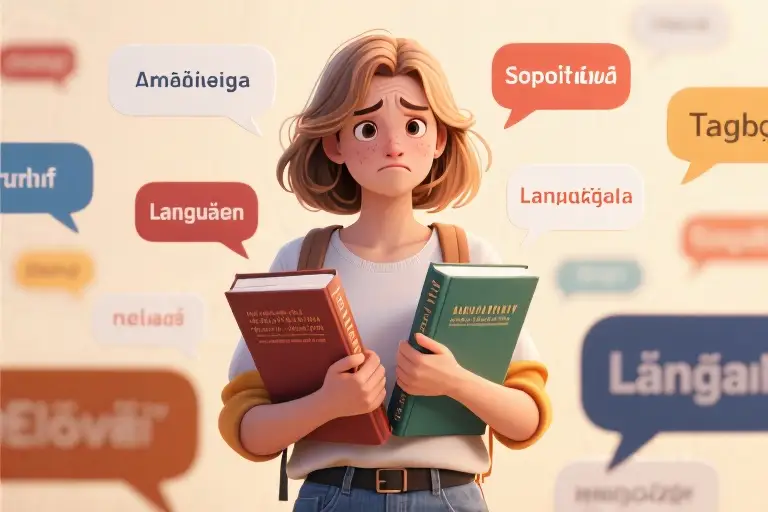The first time I witnessed the chaos caused by linguistic false friends, I was at a birthday party in Berlin. An American friend proudly handed over a beautifully wrapped box to our German host, announcing with a smile: “This is my special gift for you!” The room fell silent. Our host’s face turned pale as he gingerly accepted the package, clearly debating whether to call poison control. That’s when I learned the hard way: in German, ‘Gift’ means poison, not present.
Moments like these make language learners want to facepalm. We’ve all been there – confidently using a word that looks familiar, only to realize we’ve accidentally said something completely unintended. Maybe you’ve complimented a Spanish speaker’s ’embarazada’ (pregnant) appearance when you meant to say they looked ’embarrassed.’ Or perhaps you told your Italian date you were ‘excited’ to see them, inadvertently implying something far more… intimate than intended (English ‘excited’ vs Italian ‘eccitato’).
These linguistic traps have a name: false friends (or ‘false cognates’ to linguists). They’re words that appear identical or remarkably similar across languages but carry different meanings – sometimes dangerously different. As someone who’s taught English to Italian students for years, I’ve developed a sixth sense for spotting these verbal landmines. Just last week, I had to explain why telling your boss you’re ‘actually’ available doesn’t mean you’re currently (‘attualmente’) free in Italian.
What makes these false friends particularly treacherous is their shared ancestry. Many trace back to the same Latin or Germanic roots, but centuries of linguistic evolution sent their meanings drifting apart like estranged cousins. Interestingly, English often plays the rebel in these family dramas – while most European languages stayed closer to the original meanings, English took creative liberties. That’s why ‘gift’ kept its poisonous meaning in German (closer to the Old Norse ‘gipt’) while English made it about generosity.
This introduction is your survival guide to navigating the minefield of false friends. We’ll explore why these linguistic doppelgangers exist, uncover the most common (and embarrassing) examples, and equip you with strategies to avoid communication disasters. Whether you’re learning Spanish, French, German or Italian, understanding these false friends could save you from anything from mild confusion to serious social blunders. So – what’s your most memorable false friend mishap? (Don’t worry, we’ve all got one.)
False Friends: The Hidden Traps for Language Learners
We’ve all been there. You’re confidently using a word that looks familiar in your target language, only to realize it means something completely different. These linguistic decoys are known as false friends (or false cognates) – words that appear similar across languages but carry different meanings. As someone who’s taught English to Italian students for years, I’ve witnessed countless false friend mishaps that range from amusing to downright awkward.
What Makes a False Friend?
False friends differ from true cognates – words that share both form and meaning across languages (like ‘music’ in English and ‘musica’ in Italian). They’re the wolves in sheep’s clothing of language learning. Consider these classic examples:
| English Word | German Counterpart | Meaning Difference |
|---|---|---|
| Gift | Gift | Present vs. Poison |
| Fast | Fast | Quick vs. Almost |
| Bald | Bald | Hairless vs. Soon |
Classroom Confessions: Top 3 False Friend Fails
Through teaching hundreds of students, I’ve identified these recurring false friend pitfalls:
- The Romance Language Trap
Italian students frequently misuse “actually” (meaning ‘in fact’) when they intend to say “attualmente” (meaning ‘currently’). This stems from both words sharing the Latin root ‘actus’ but evolving differently. - Germanic Misdirection
English speakers learning German often confuse “bekommen” (to receive) with “to become,” leading to sentences like “I will become a present” instead of “I will receive a present.” - Spanish Slip-Ups
The classic “embarazada” (pregnant) vs. “embarrassed” confusion remains one of the most cringe-worthy false friend moments in language classrooms.
These examples highlight why understanding false friends goes beyond vocabulary building – it’s essential for avoiding communication breakdowns. In the next section, we’ll explore why languages develop these tricky word pairs through fascinating historical shifts.
Pro Tip: When encountering a familiar-looking word in your target language, pause and verify its meaning. That moment of caution could save you from an awkward situation!
The Historical Roots: Why Did These Linguistic Cousins Drift Apart?
Language evolution works much like family trees – words that share common ancestors often grow apart over centuries. The phenomenon of false friends becomes far less puzzling when we trace their journeys through history.
The Latin Legacy in European Languages
Most European languages share a deep connection to Latin, either directly (like Spanish, French, and Italian) or through extensive borrowing (like English). This shared ancestry explains why so many similar-looking words exist across languages. However, just as siblings might develop different personalities, these linguistic cousins gradually took on distinct meanings.
Three key factors caused English to diverge from its European relatives:
- The Norman Conquest (1066) – When French-speaking Normans invaded England, they brought thousands of Latin-derived words. Existing Old English words often shifted meanings to avoid overlap. For example, the Old English ‘giefu’ (meaning gift) became associated with poison in German, while English adopted the French ‘present’ for positive gifts.
- Localization – Words adapt to local cultures. The Latin ‘actualis’ (meaning ‘relating to action’) became ‘actual’ in English (meaning ‘real’), while in Spanish ‘actual’ simply means ‘current’. This explains why Spanish speakers might say “the actual president” when they mean “the current president.”
- Semantic Narrowing – Some words specialized differently. The Latin ‘excitare’ (to awaken) became ‘excited’ in English (enthusiastic) but developed more physical connotations in Italian (‘eccitato’ meaning aroused).
A Case Study: The Wandering Word “Actually”
This common adverb perfectly illustrates how English went its own way:
- Latin root: ‘actus’ (a doing, performance)
- Old French: ‘actuel’ (current, now existing)
- Modern French: ‘actuel’ still means “current”
- English: ‘actually’ shifted to mean “in fact” or “really”
This explains why French learners might incorrectly say “I’m actually working on this project” when they mean “I’m currently working…” – their brain naturally maps ‘actuellement’ to ‘actually’.
Why English Became the Linguistic Rebel
While other European languages maintained closer ties to Latin meanings, English underwent dramatic changes:
- Vocabulary Overhaul: After the Norman Conquest, English absorbed about 10,000 French words
- Grammatical Simplification: Lost many inflections, making word meanings more context-dependent
- Global Influence: As English spread worldwide, it absorbed and adapted words differently
This historical context helps explain why English speakers learning European languages encounter so many deceptive cognates – our shared vocabulary took different evolutionary paths. Understanding these roots makes false friends easier to spot and remember.
The False Friends Field Guide: Navigating Linguistic Minefields
Why You Need This Handbook
Every language learner eventually encounters those deceptive words that seem familiar yet betray you in conversation. These linguistic doppelgängers – what we call ‘false friends’ – have caused more cross-cultural misunderstandings than bad Google Translate ever could. This chapter serves as your survival guide to the most treacherous examples across European languages.
Danger Zone: Complete Meaning Reversals
These words look identical but could mean the exact opposite of what you expect. Handle with extreme caution:
| English | German | Meaning Difference | Memory Tip |
|---|---|---|---|
| Gift | Gift | Poison (not present) | “Poison is the German’s gift to the unwary” |
| Fast | Fast | Almost (not quick) | “Almost fast… but not quite” |
| Bald | Bald | Soon (not hairless) | “Soon you’ll be bald from stress over false friends” |
Classroom Confession: My Italian student once told his host family he was “excited to see the Vatican” using “eccitato” – the resulting awkward pause taught us all why context matters.
Partial Traps: The Slippery Slope Words
More insidious are words with overlapping but not identical meanings:
Spanish Examples:
- Embarazada ≠ Embarrassed (means pregnant)
- Example: “Estoy embarazada” → “I’m pregnant” (not “I’m embarrassed”)
- Memory hook: “Pregnancy lasts longer than embarrassment”
French Pitfalls:
- Librairie ≠ Library (means bookstore)
- Example: “Je vais à la librairie” → “I’m going to the bookstore”
- Visual cue: Imagine buying books (not borrowing) at a French librairie
Emotional Quicksand: Feelings That Get Lost in Translation
Body and emotion-related words often cause the most cringe-worthy mix-ups:
| English | Italian | Actual Meaning | Warning Level |
|---|---|---|---|
| Excited | Eccitato | Sexually aroused | ☢️ High |
| Sensible | Sensibile | Sensitive (not reasonable) | ⚠️ Medium |
| Constipated | Constipado | Has a cold | 😳 Extreme |
Pro Tip: Always double-check bodily function vocabulary – your dignity depends on it.
The Professional’s Cheat Sheet
For teachers and advanced learners, here’s a rapid-fire list by category:
Food Faux Pas:
- Spanish pan = bread (not cooking pan)
- German Marmelade = jam (only citrus flavors)
Academic Traps:
- French collège = middle school
- Spanish carrera = university degree (not career)
Memory Technique: Create absurd mental images (e.g., imagining poisoning someone with a birthday gift) to cement the differences.
Your Action Plan
- Bookmark this page as a quick reference
- Highlight false friends in your vocabulary notebook with ⚠️ symbols
- Practice with our interactive quiz in Chapter 5
Remember: Even native speakers occasionally stumble over these linguistic traps. The key is awareness – now that you’re forewarned, you’re forearmed!
Mastering False Friends: Practical Strategies for Language Learners
The Contrast Method: Side-by-Side Learning
When dealing with false cognates, creating direct comparisons between languages can rewire your brain’s association patterns. Here’s how to implement this effectively:
- Dual-Column Vocabulary Lists
- Maintain a dedicated notebook or digital document with two columns
- Left column: English word with definition and sample sentence
- Right column: Similar-looking word in target language with its actual meaning
Example comparison:
English: Library (place to borrow books)
"I borrowed three novels from the public library."
French: Librairie (bookstore)
"J'ai acheté ce roman à la librairie du quartier."- Visual Association Techniques
- For words with dramatically different meanings, create memorable mental images
- German “Gift” (poison) vs English “gift”: Imagine unwrapping a beautifully wrapped box that contains a skull-and-crossbones symbol
- Spanish “Embarazada” (pregnant) vs English “embarrassed”: Picture someone blushing while holding a positive pregnancy test
- Color-Coded Flashcards
- Use red borders for dangerous false friends (completely different meanings)
- Yellow for partial overlaps (some shared meaning but significant differences)
- Green for true cognates (nearly identical meanings)
Root Word Analysis: 5 Latin Origins That Explain Common False Friends
Understanding these core Latin roots helps predict when words might be false friends:
- -Act- (Action/Current)
- English “actual” (real) vs Spanish “actual” (current)
- Both from Latin “actus” (done, driven), but English specialized in “realness” while Romance languages kept temporal meaning
- -Sens- (Feeling/Judgment)
- English “sensible” (practical) vs Spanish “sensible” (sensitive)
- From Latin “sensus” (feeling), English shifted toward rational interpretation
- -Fab- (Story/Craft)
- English “fable” (story) vs French “fable” (lie)
- Latin “fabula” originally meant both, but French developed negative connotation
- -Pres- (Before/Almost)
- English “preservative” (food additive) vs French “préservatif” (condom)
- From Latin “praeservare” (to guard beforehand), with different protective applications
- -Libr- (Book/Free)
- English “library” vs Spanish “librería” (bookstore)
- Both from “liber” (book), but English term shifted to borrowing institution
Contextual Practice: From Theory to Real-World Usage
- Fill-in-the-Blank Exercises
Complete these sentences with the correct word from your target language:
a) After drinking the mysterious liquid, he realized it was __ (German: Gift/English: gift)
b) She went to the __ to buy the new bestseller (French: librairie/English: library)
c) His __ reaction showed he misunderstood the word’s meaning (Italian: eccitato/English: excited)
- Error Correction Examples
Analyze these common mistakes from language learners:
Incorrect: “I’m so excitado for the concert tonight!” (Spanish learner)
Correction: “I’m so emocionado for the concert tonight!”
Why: “Excitado” implies sexual arousal in Spanish, while “emocionado” conveys happy anticipation
- Role-Playing Scenarios
Practice these common situations where false friends might cause confusion:
- Ordering at a French restaurant (“preservative” mix-up)
- Asking directions to a Spanish “librería” when you want a library
- Discussing sensitive topics where “sensible” might be misinterpreted
Pro Tip: The 3-Question Filter
Before using a word that looks familiar in your target language, ask:
- Have I verified this word’s meaning in a reliable dictionary?
- Does the context support this interpretation?
- Have I encountered native speakers using it this way?
This simple checklist can prevent most false friend mistakes in real conversations.
Test Your False Friends Immunity: A 5-Question Challenge
Now that we’ve explored the deceptive world of false cognates, let’s put your knowledge to the test. These five situational questions cover common traps in German, French, Spanish, and Italian—the usual suspects when it comes to language learning mistakes. Don’t worry if you stumble; each answer includes fascinating historical insights to help the lesson stick.
Question 1: The German Connection
Your Berlin colleague says: “I’ll be there bald.” This means:
A) He’s losing hair
B) He’ll arrive soon
C) He’s feeling brave
Answer: B) He’ll arrive soon
Why? This classic false friend stems from Old English “beald” (brave), but while English shifted meanings, German retained the Proto-Germanic sense of “quick” or “direct.” Modern German “bald” shares roots with “bold” but means “soon”—a perfect example of semantic divergence.
Question 2: French Dining Dilemma
A Parisian menu lists “librairie” under dessert options. You’re expecting:
A) A book-themed pastry
B) A cheese plate
C) A literary discussion
Answer: Trick question! “Librairie” means bookstore in French.
Why? Both English “library” and French “librairie” derive from Latin “librarium” (book repository), but French narrowed the term to commercial bookshops during the Renaissance. For actual libraries, say “bibliothèque.”
Question 3: Spanish Health Alert
Your Madrid host asks if you’re “constipado.” They’re inquiring about:
A) Digestive issues
B) A head cold
C) Traffic congestion
Answer: B) A head cold
Why? From Latin “constipare” (to crowd together), English adopted the digestive meaning in the 14th century while Spanish applied it to nasal congestion. This medical false friend causes endless clinic confusion!
Question 4: Italian Emotion Check
An Italian friend says they’re “sensibile” to criticism. They mean:
A) They’re reasonable about feedback
B) They’re easily hurt
C) They make logical critiques
Answer: B) They’re easily hurt
Why? While English “sensible” implies practicality (from Latin “sensibilis” = perceptible), Italian retained the Vulgar Latin meaning of “emotionally sensitive.” For English-style “sensible,” use “ragionevole.”
Question 5: Multilingual Mix-Up
The word “actual” appears in four languages. Which one matches English’s meaning?
A) Spanish “actual” = current
B) French “actuel” = present-day
C) Polish “aktualny” = relevant
D) None of the above
Answer: D) None of the above
Why? English hijacked “actual” from Medieval Latin “actualis” (active) to mean “real,” while other European languages kept temporal meanings. This explains why Spanish “en la actualidad” means “currently,” not “actually.”
How Did You Score?
- 5/5: False friend exterminator! Share your tips in the comments.
- 3-4: Solid awareness—bookmark our vocabulary tables for reference.
- 0-2: Don’t worry! These traps snag even advanced learners. Try our contrastive memorization technique:
Create dual-column notes:
English "fabric" = material | French "fabrique" = factory
English "eventually" = finally | Spanish "eventualmente" = possiblyFor deeper dives, explore our partner resources:
- Interactive False Friends Database (Filter by language pair)
- Etymology Maps (Visualize word migrations)
Pro Tip: When encountering familiar-looking words, ask yourself: “Would this make sense if translated literally?” That pause could save you from accidentally telling your German friend their birthday “gift” is poisonous!
Wrapping Up: Mastering False Friends with Confidence
Throughout this guide, we’ve uncovered the sneaky world of false friends – those linguistic traps that lurk between English and other European languages. From German’s poisonous “Gift” to Italian’s misleading “eccitato,” these vocabulary doppelgängers prove that language learning isn’t just about memorization, but cultural understanding.
Why This Matters More Than You Think
Every language learner encounters false friends eventually. They’re not just occasional hiccups – studies show that 68% of intermediate learners make false friend errors weekly. The good news? Systematic awareness cuts these mistakes by nearly half. By recognizing patterns in how English diverged from other European languages, you’re not just avoiding embarrassment (like congratulating someone on being “embarazada” in Spanish), you’re developing deeper linguistic intuition.
Your False Friends Survival Kit
- Bookmark the Vocabulary Tables: Our categorized lists (danger words vs. trap words) serve as quick references during study sessions
- Apply the 3-Context Rule: When encountering a new cognate, check its meaning in three different sentences
- Etymology as Your Secret Weapon: Remember how Latin roots evolved differently – “actual” versus “attuale” makes sense when you know their shared history
Join the Conversation
Language learning thrives on shared experiences. In the comments:
- Share your most memorable false friend mishap (no judgment!)
- Help others by adding to our community-sourced “Watch Out For…” list
- Vote on which language pairing we should explore next in this series
Continue Your Linguistic Adventure
Dive deeper with these curated resources:
- Interactive Tool: EtymOnline – Trace any word’s historical journey
- Specialized Course: “Decoding False Cognates” on [languageplatform].com (use code FRIEND20 for our reader discount)
- Mobile Practice: The False Friends Flashcards app (available iOS/Android)
Remember, every mix-up is progress in disguise. As my Italian students now proudly say (correctly!): “We’re excited to keep learning” – not “eccitati,” thankfully. Your language journey just got smarter.
P.S. Found yourself saying “That’s not what I meant!” in another language? You’re in good company – screenshot and tag us @linguafalsefriends with your story.





